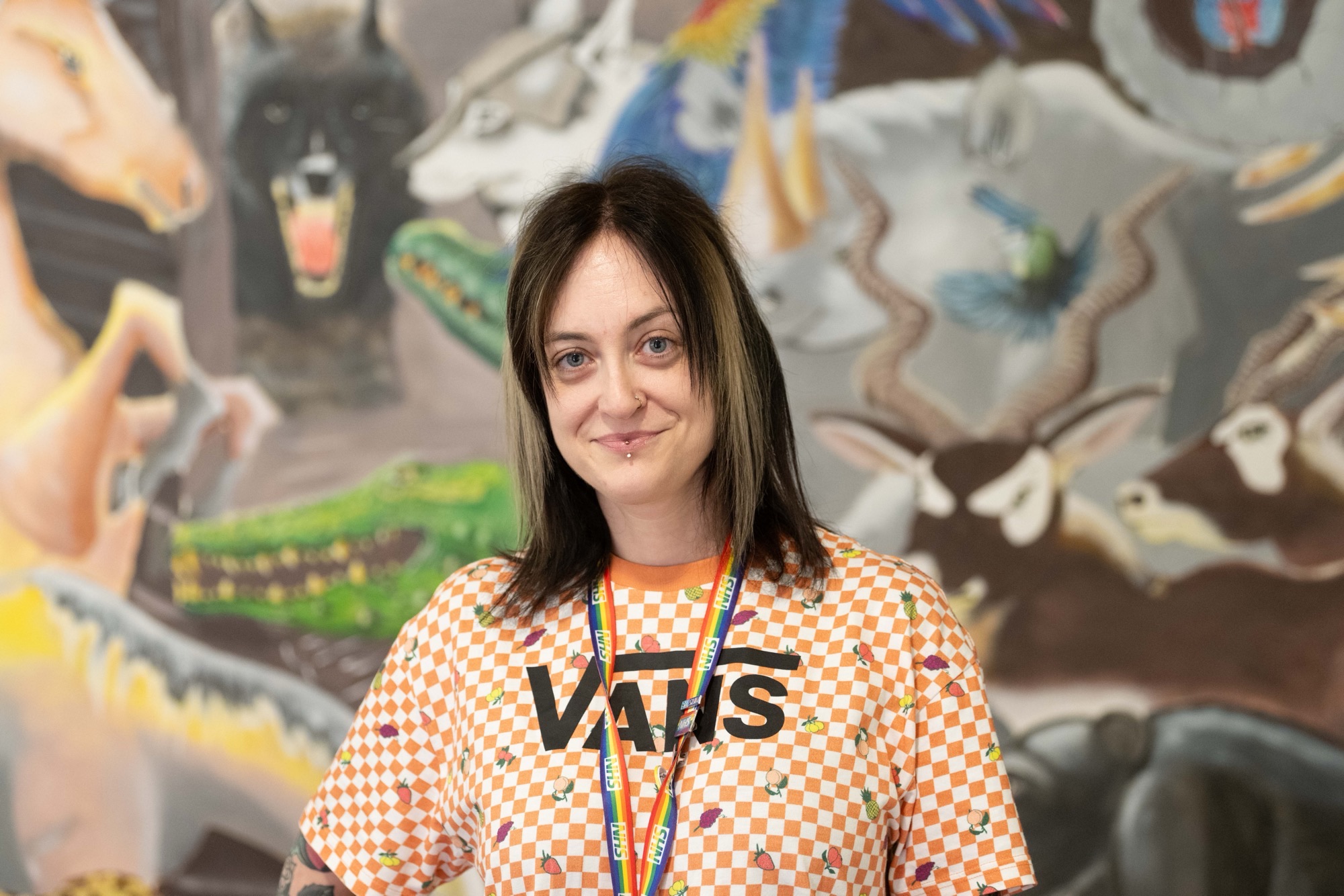
Sara Galvin’s tenacity in supporting and advocating for vulnerable people is admirable.
It is an ethos she has put into practice in running Coventry and Warwickshire Partnership NHS Trust’s (CWPT) mental health homeless pathway service, helping anyone who is homeless or at risk of eviction due to mental illness to access accommodation and therapy.
In 2021, she took on managing the service single-handedly and, last year, her work was recognised with a silver award at the Social Worker of the Year Awards, in the mental health social worker category.
Speaking to Community Care, Galvin talked about her triumphs and struggles leading the pathway, working in the sector as an autistic practitioner and what needs to be done to make the workplace more supportive for neurodivergent people.
What led you to pursue a career in social work?
I wanted to work in the social sector after my bachelor’s degree, but life took a different turn for me. I married at 21 and, at 23, became a stay-at-home mother at to my two children, until they went to primary school.
In 2011, shortly before getting divorced, I became a support worker at People in Action, a charity for people with a learning disability, I helped service users meet their personal care needs and achieve independence as much as possible by assisting them with laundry, preparing meals and taking prescribed medicines.
However, I wanted to do more impactful work.
I pursued a master’s degree in social work at Warwick University from 2012-14 and was fortunate, as the university funded half of the degree.
During my time as a social worker in the child protection service at Warwickshire County Council, I became drawn to aspects of mental health, when I had to work with parents with mental health complications or teenagers with similar issues.
It was a few years later, in 2019, that I made the big move to join the mental health team in the Coventry and Warwickshire Partnership NHS Trust.
It was a major decision, but the right move for me.
Can you tell me a bit about the homelessness pathway?

Photo provided by Sara Galvin
At the pathway, we accept referrals directly from homeless people, charity organisations, the council, community mental health teams, access hubs and other housing providers.
We support anyone who is homeless or at risk of eviction because of serious mental illness.
Once we get involved, our goal is to sort out accommodation and link people to the correct mental health service. We have helped people who have been sleeping rough get housing assessments and then get access to temporary accommodation.
Our clients were invisible until the pathway came into being. They are often ignored by society and do not have anyone, including family, to advocate for them.
What are the challenges you have faced while running the pathway?
A huge challenge has been managing the workload by myself when the pathway was launched, as I was the only post in the service at the time. I started the role in December 2021, and in July 2022, a support worker joined the team.
I manage multiple tasks in the pathway. For example, mental health teams email me asking about someone who has been moved around and whose location is not known.
Celebrate those who’ve inspired you
For our 50th anniversary, we’re expanding our My Brilliant Colleague series to include anyone who has inspired you in your career – whether current or former colleagues, managers, students, lecturers, mentors or prominent past or present sector figures whom you have admired from afar.
Nominate your colleague or social work inspiration by either:
- Filling in our nominations form with a letter or a few paragraphs (100-250 words) explaining how and why the person has inspired you.
- Or sending a voice note of up to 90 seconds to +447887865218, including your and the nominee’s names and roles.
If you have any questions, email our community journalist, Anastasia Koutsounia, at anastasia.koutsounia@markallengroup.com
I have links with the council, so am able to find out information about the person, but it takes time to contact the right people and sift through the information.
Staff from hostel accommodations may also contact me about someone needing a mental health assessment, but they may not know how to go about it because the clients are difficult to communicate with or sometimes hard to reach.
Because people who are homeless are difficult to reach and may take time to trust our services, I have to think of out-of-the-box measures to support people in distress.
What are some of the out-of-the-box measures you have taken?
I do not like saying no to problems or giving up.
When a challenge comes up, I need to find out more about it and figure out a solution.
I work very closely with our approved mental health professional hub to support homeless people.
As it is unrealistic to expect our clients to come to us, I am willing to go wherever they are. I have gone to ditches and the top of a hill to see if there are people there in need of mental health assessments and housing.
It is never easy, but I like the challenge, it makes my job interesting and keeps me on my toes.
How has the service benefited the people you work with?
There are a few stories that reflect how the service has helped people.
One is Wayne’s story. In September 2023, he was evicted from his house by his father and stayed on the streets for a few days. He then found temporary accommodation in a hostel at the Salvation Army.
On one of my visits there, I met Wayne downstairs, and he was very distressed and in a state of panic. He thought I was a staff member and started talking to me.
I helped him get admission into CWPT’s Caludon Centre, where he received treatment for psychosis for two months. He was eventually discharged and went back to the Salvation Army where they gave him a room to stay.
I was involved with Wayne throughout. I used to have conversations with him, when he was at Cauldon, about his treatment and stayed in touch with his psychiatrists to monitor his progress.
Another case was of a lady who was floridly psychotic and regularly begging in town. I helped her get admission to a mental health centre and now I am working towards getting her into supported accommodation.
What was your experience of working in social work with undiagnosed autism?
It was not a great experience, especially in children’s services.
I always hold onto things that I feel are right and fight for people who need support. Many people considered me as argumentative and strong willed as a result.
I used to have meltdowns because I was overstimulated and misunderstood.
So, working when I was undiagnosed was quite hard because there nothing for me to explain why I acted and felt the way I did.
How did the diagnosis change your experience in the workplace?
I can now mention it at work and people will be more understanding. This has lifted a bit of the pressure on me to wear a mask and always explain myself, which I did when I was undiagnosed.
It has helped build connections with clients who are neurodivergent. I do not always self-disclose, but where appropriate, it helps build rapport and enables us to understand each other better.
Raising a child with autism has also helped me be more compassionate and empathetic as a social worker.
The diagnosis made me want to raise awareness about it in the workplace. I feel I need to talk about my experiences so that others going through the same do not feel alone.
Now I can see that my autistic traits make me wholeheartedly fight for homeless people and ensure they are supported and not invisible.
What do you think could be done to make the workplace more supportive for neurodivergent people?
There needs to be better management, that’s key.
It’s not rocket science, but more needs to be done about treating people equitably and respecting that we all work in different ways.
Simply because I work in a way that is different from most people does not mean that is wrong. Understanding that takes time, but it is important to empathise with differences.
I am a new manager myself. That’s been a massive challenge to me. We work very well together, but my co-worker does not work in the same way as I do.
Being a manager has shown me that neurodivergent people can work in an amazing way. It needs to be embraced more in the workspace and our work styles should be understood and accepted.
But since social work is stressful, managers often forget to take time out for neurodivergent people to understand where they come from.
I hope we can create a more inclusive space for neurodivergent staff [in the pathway] and honour our differences.
Share your story
 Picture: daliu/fotolia
Picture: daliu/fotolia
Would you like to write about a day in your life as a social worker? Do you have any stories, reflections or experiences from working in social work that you’d like to share or write about?
If so, email our community journalist, Anastasia Koutsounia, at anastasia.koutsounia@markallengroup.com



 Bournemouth, Christchurch and Poole
Bournemouth, Christchurch and Poole  Hampshire County Council
Hampshire County Council  Lincolnshire County Council
Lincolnshire County Council  Norfolk County Council
Norfolk County Council  Northamptonshire Children’s Trust
Northamptonshire Children’s Trust  South Gloucestershire Council
South Gloucestershire Council  Wiltshire Council
Wiltshire Council  Wokingham Borough Council
Wokingham Borough Council  Children and young people with SEND are ‘valued and prioritised’ in Wiltshire, find inspectors
Children and young people with SEND are ‘valued and prioritised’ in Wiltshire, find inspectors  How specialist refugee teams benefit young people and social workers
How specialist refugee teams benefit young people and social workers  Podcast: returning to social work after becoming a first-time parent
Podcast: returning to social work after becoming a first-time parent  Podcast: would you work for an inadequate-rated service?
Podcast: would you work for an inadequate-rated service?  Family help: one local authority’s experience of the model
Family help: one local authority’s experience of the model  Workforce Insights – showcasing a selection of the sector’s top recruiters
Workforce Insights – showcasing a selection of the sector’s top recruiters 

 Facebook
Facebook X
X LinkedIn
LinkedIn Instagram
Instagram
It’s heartening, as an NDer, to see such celebration for Sara Galvin; neurotypical bias is though a long way from ‘getting it’ and social work advocacy is very much needed.
Why though, as with the Manchster homelessness services (also covered recently in CC) and previously with the CANDI assertive outreach team for the homeless, do we test out or experiment with people marginalised and excluded. And, why is this solely focused on neurobiology as the panacea to structural inadequacies. More biases, no?
Maybe, as Eileen Munroe said, that social work is a Complex Adaptive System (btw ~ it is) and from within the hermeneutic of psychology the research inferences now being made hold true. Afterall, there’s nothing more powerful as demonstrated in this (and the other) article than having referential power. The approach speaks for itself, right?
I, ever curious, wonder about the s75 NHS Agreements and the how of arriving at such services development, and at what scale, and the replication of such elsewhere.
I wonder about ‘cherry picking’ too; 60% of success is, in ‘selling’ attributed to increasing visibility of the product ~ it’s called shelf positioning ~ and the ‘rise’ again of the languages of dual diagnosis and complex needs.
I also wondered, following comments made in CC about the contributions made by David Howe on Attachment Theory and Core Principles and Knowledge, about the enduring power of postmodernism within the profession. Is this merely a rehashing of ‘the social inadequacies’ model (see Peter Archard: The Mad, Sad and Bad: Societies Confused Response to Vagrant Alcoholics cica late 70s early 80’s) ~ afterall, the, late, Sheila McKechnie of Shelter said ‘people are homeless because they have nowhere to live’ and prompted by the poetry of The Trouberdore of Verse who painstakingly writes about homelessness across the US from the lived perspective and the repeated exclusion of those who won’t do as they’re told ie behavioural agreements of abstinence.
I wondered about the longevity of the Peterloo Project, also (historically) a pioneering Manchester service offering ‘wet houses’ ie drinking permitted, and I wondered about the basis of neurobiology in the philosophy of Keirkegaardian notions of abandonment anxiety, and the nervous system and brain responses to such.
I wondered whether transcranial magnetic stimulation to assess brain plasticity is likely to see a resurgence (Leeds University around 2003 lead a research team looking at abnormal or disruptions to intentionality in brain plasticity amongst a cohort of people who experienced major psychosis but mainly schizophrenia)
I reached for a go-to reference ‘Mind, Meaning and Mental Disorder: The Nature of Causal Explanation in Psychiatry and Psychology’ by Derek Bolton and Jonathan Hill. And, as I ponder the recent ‘selling’ of Leon Brenner’s ‘The Autistic Subject’ and his introduction of the ‘dermic drive’ as an addition to the sex and death drive, I minded towards Brenners, and almost throw away comment, that his signifier for writing was the economics emerging from the neoliberal’selling’ of neuro-diversity.
So, just as I am heartened by Sara’s achievement I am also watching the Governments reaction to the recent petition by 100 Councils (across all-parties) to turn the tide and stop the rot of Social Housing. In 1997 the Homeless Alliance, formerly CHAR, championed the idea of ‘conviviality’ of working at grass roots, you know estate based work, as the way to prevent youth homeless at source ie at home.
Homelessness, is a cash cow and, perhaps, the quickest way to make a million. So, while ‘we’ celebrate the inclusion of NDers lets also keep an eye on the financial pictures and environment.
NHS CANDI used the majority of their ‘Supporting People’ allocation, which ran into the tens of millions, to secure the financing of becoming a Foundation Trust ie 1yrs operating surplus while actually spending about a sixth ie 500k on direct delivery. VolOrgs have exploited the financial gains of Housing Benefit to move away from local delivery to become regional and national providers ~ the same is true of All drug and alcohol services.
Maybe it’s time to ask that s75 NHS Agreements are the norm? Although, I’d guess that it’d take an NDer to see the patterns and a neurotypical to make the case.
Together is better, right?